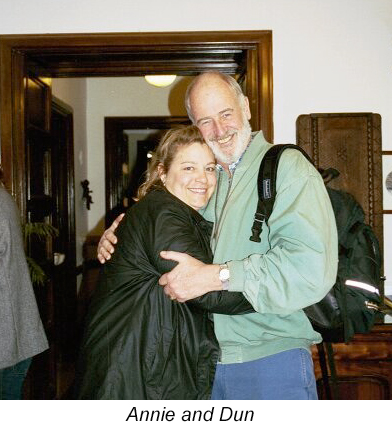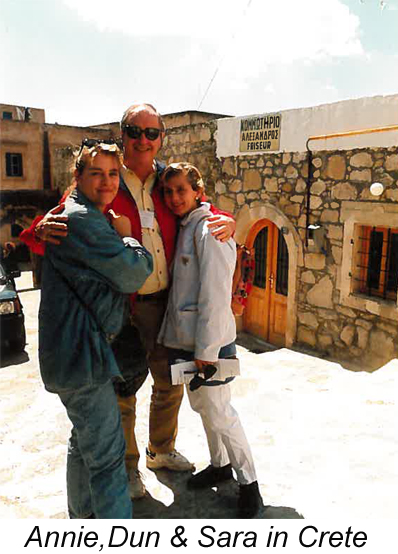Annie Copps Remembers Dun and Other Wonderful Oldways Memories
Today is a bittersweet day for me and for so many of us. Today marks the anniversary of Dun Giffords passing. Bitter for all the obvious reasons. Like the unripe, uncured olive he tricked me into eating in Ragusa, SicilyI didn’t and dont like the idea of it and my body fully rejected it. Sweet, because all the good and fun memories of Dun, Sara, and Oldways are clickering through the grey folds of my brain and it feels like watching an old home movie on the couch and there is great comfort in that. I miss and love you KDG. – Annie
How could I possibly distill my thoughts and experiences about the Med into this one blog post Another impossible task set forth by Oldways. Yet, anytime Sara and her team set forth to do something, despite the implausibility (not absurdity) of the idea, they accomplish it with grace and positivitysometimes by sheer determination and optimism. I know this, perhaps better than most, I was the program manager for Oldways in the 1990s.
My memories of the Med during that beautiful epoch of my life are vast and varied. For most of you it was and is about the actual experience of
conferences and the ancient and faraway lands of Greece, Italy, Turkey, Spain, Morocco, and Tunisia. During that time for me, the actual on-the-ground Mediterranean was about 25% of my experience and memories. For us, it was the one to two years of planning and the preparation, the minutiae, that went into gathering more than 100 experts in a myriad of disciplines from around the world for a week of hard science and cultural immersion. That translates from Greek, Italian, Spanish, and Arabic into: planes, trains, automobiles, slide projectors, names tags, programs, rooms, ights, and visas, among the many details.
There were important attendees from far away places who were easy-going and easy to accommodate and there were attendees who pleaded and made a case to be part of our exciting mission and yet once on the ground, at the symposium, wouldnt have been satisfied had we brushed their teeth for them. At the home once, it was always something. We had an intern who accidentally set the auto-postage machine to $2.40 per envelope instead of 24 cents. (Remember Vita She hand-carried that heavy machine and all the envelopes to the U.S. Post Once and got our money backI think the machine weighed more than she does.) We had an a graphic designer who brewed his own beer: He gave each of us a bottle, which we all put on our desks and most of the bottles exploded in the middle of the night, ruining all the paperwork (and in some cases computer keyboards) on our desks. Mine didn’t explode that night with the others, but I was lucky to be out of room when it did. I suspect there are still bits of brown glass and hops embedded in the ceiling of the once on Milk Street.
Much of the Mediterranean Diet experience for me and the staff at home, was trying to figure out how to it the name Bambatzimbopolous onto a name tag (there was no way her first name, Soa I think it was, was possible) or how to get 8 boxes of printed materials onto an international ight without being charged (imagine that now) or how to distract the passport official long enough to get a co-worker through the line with an expired passport (it was pre 9/11 and it worked).
Or do I tell you a story or two about the hotel room keys that got passed around
Yes, there were all those stories and more, including the hurdles of sharing hotel rooms with co-workers (including one who wasn’t fond of the trappings of clothing and inexplicably chose to put her shoes on first when succumbing to getting dressed, bending over and tying the laces of her sneakers).
However the best memories were and are that of the beautiful foodways and traditions of the Mediterranean culture. It was visiting the ancient frantoios. The bee keepers. The artichoke growers. The pasta makers. Cramming into long wooden tables in the small villages where the ladies prepared lunch. It was picking quince of the trees in Chios and making quince jam. It was meeting and working with the generous minds of internationally revered and engaged public health officials, chefs, nutritionists, and journalists. It was working together to preserve and promote healthy, traditional foodways and every time I purchase olive oil, nuts, dried beans, and ancient grains (and I often do) I do it because I learned first hand from the masters how important they are to my own health and the health of the community.








Leave a comment